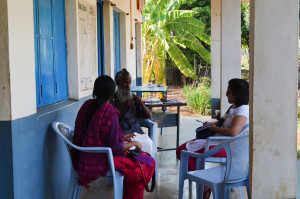Serious human rights violations occur across the world on a daily basis, yet very few, if any, are reported, either in the international media, academia or in the public sphere more generally. Fact finding missions allow for these violations to be documented and publicised and therefore create a space where human rights violations can be exposed and hopefully, in the future, prevented.
The activists from the Initiative on a fact finding mission to Chhattisgarh
Undertaking fact finding missions is a key strategy of the Reproductive Rights Initiative. The Initiative has conducted numerous fact findings in thirteen Indian states since 2011. Fact finding reports are used by the Initiative to support legal and social interventions on a wide range of reproductive and sexual rights. The Initiative has coordinated fact findings on subjects as diverse as the international surrogacy industry, child marriage, unsafe and unlawful sterilization and medical services available to pregnant and lactating homeless women. By working closely with local activists, advocates and NGOs, the Initiative ensures that its fact findings are as accurate, informative and reliable as possible. The Initiative has successfully utilised fact finding reports as evidence of human rights violations in the Indian courts and as advocacy tools to show the need for higher standards of reproductive and sexual rights.
Research & Fact-finding
Report on out of pocket expenditure: A study in the slums of Delhi
Research and Fact Finding
India accounts for a large amount out-of-pocket expenditure pushing almost 40 out of 100 patients under poverty line after treatment simply because health services are extremely expensive in India (National Sample Survey). Almost 70% of income goes into buying medicines and health checkups. India is lowest when it comes
....
Read More.
Sanitation in slum cluster
Research and Fact Finding
Public hygiene is one of our country’s great problems. Fixing dreadful sanitation in India requires not just building lavatories but also changing habits. Appalling situations of housing, sanitation, civic amenities, education, lack access to safe drinking water, proper sanitation facilities and health abound in urban slum clusters of Delhi.
The
....
Read More.
Lack of ambulance services and the referral system in slums Of Delhi
Research and Fact Finding
“India requires better emergency medical service to meet the growing number of emergencies. What exists currently in the form of fragmented services across the country falls way short of meeting the requirement.” – Prasanthi Potluri (Editor Asian Hospital &Healthcare Management)
An effective emergency referral transport system is the link between
....
Read More.
Fact Finding Report on Right to Health & Maternal Health
Research and Fact Finding
While India has performed poorly on maternal healthcare than any other country in the world, approximately 17.3% of the world’s population, India accounts for 19% of the world’s maternal deaths. Assam has recorded the highest maternal mortality rate in India at 328 (Sample Registration Survey (2010-2012) as compared to
....
Read More.
Birth Registration : Fact Finding Report; Delhi
Research and Fact Finding
Article 7, UNCRC: “The child shall be registered immediately after birth and shall have the right from birth to a name, the right to acquire a nationality and. as far as possible, the right to know and be cared for by his or her parents”
India’s National Population Policy (2000)
....
Read More.
Litigation
- Presentations from the Two Day Webinar on Reproductive Rights on 23rd & 24th of May, 2020
- Patna High Court: Ration facility for all transgender persons
- Nikhil Datar vs. Union of India: A long drawn struggle
- Patna High Court gives favourable order in response to the PIL on water logging in the state
- Guwahati High Court delivers landmark judgement; Department of Health and Family Welfare to pay Twenty Five Lakh Rupees to Petitioner in Nagaland
Fact Finding
- Presentations from the Two Day Webinar on Reproductive Rights on 23rd & 24th of May, 2020
- Report on the State level Consultation in Arunachal Pradesh on 2nd & 3rd November, 2019
- Sexual and Reproductive Health Rights Dictionary
News
- Report of the two day webinar on ‘Access to Reproductive Justice’ on 23rd & 24th May, 2020
- Report of the National level consultation on Trans people and women’s issues- 28th & 29th December, 2019
- Nikhil Datar vs. Union of India: A long drawn struggle






